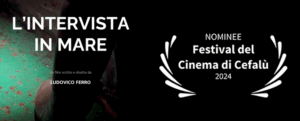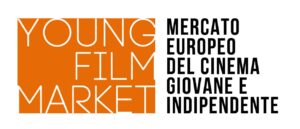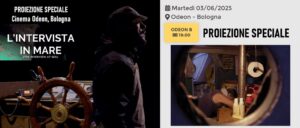The many emotions and the different audiences present at the final ceremony of the collateral award Fondazione Fai Persona, Lavoro, Ambiente
When you experience very intense emotions and experiences, the desire to talk about them immediately is very strong. In addition to the pleasure of sharing them, there may also be an unconscious fear of losing the moment, of forgetting and of not being able to effectively reconstruct and share what happened. There is certainly a risk and in a certain sense this could also explain the success of some social networks. But there is also an advantage in letting some time pass before drawing conclusions. The distance from the event allows us to carry the analysis a little deeper and therefore in a more lucid and balanced way.
We had already reported and proposed the chronicle of the special screening of L’intervista in mare as part of the final ceremony of the Collaterale Fondazione Fai, Persona, Lavoro, Ambiente award.
Today we can finally dedicate the right space to the final report.
Of the entire festival and special screenings, inevitably the transition to the Venice International Film Festival was one of the most exciting and important moments.
As we mentioned in previous articles, it all started in Venice when Ludovico Ferro, still a student, began to take an interest in festivals and cinema as places and moments to be studied scientifically. Starting in 2010, he started a research program at the University of Padua. From then on until today, a group of researchers and students participate every year at the Film Festival to study the works screened and the audience. Exactly ten years later, a further evolution.
In 2020, Ludovico Ferro, who had recently begun an experimental path of disseminating the results of his research through artistic languages, merged the academic and study activity of the festivals, and the film production activity started with Fai Cisl, into an official collateral award focused on the themes of work and the environment.

Since that very particular edition in 2020 (the year of the pandemic when only the Venice Film Festival, among the most important festivals in the world, took place in person), everything has developed more and more. The award has grown enormously in terms of prestige and audience turnout, and Fai Cisl, through Agrilavoro and the Fondazione Fai Cisl studi e Ricerche, has also effectively become a production entity with a theatrical production and five films produced or co-produced (all presented during the final event of its award).
Thus we arrive at the fifth edition of the award and the screening of L’intervista in mare (Ludovico Ferro’s debut as a screenwriter and director). It is clear, even just from what we have just briefly described, how the event was an important turning point, almost the closing of a perfect circle.
But to understand its significance we can try to answer the following question: who was there on September 6th at the meeting space of the Venice Production Bridge of the Venice Film Festival for the first special screening of L’intervista at mare?

Of course, Ludovico Ferro was there, the creator of the prize and president of the jury with the official jury (names) and the sub-jury of students and former students of the University of Padua (also present at the exhibition for research activities).


Among the special guests there was a large delegation of the crew and those who worked on the post-production of the film and also with the presence of fishermen and shipowners who participated in the filming or preliminary research phases. One of the most exciting moments of the day was the final one, after the screening of the film, in which everyone was called one by one by name and role for applause and a photo.

Obviously, the institutional and productive part of Fai Cisl could not be missed with the general secretary Onofrio Rota and the President of the Fondazione fai Cisl Studi e Ricerche Vincenzo Conso leading the delegation of regional general secretaries from all over Italy.
But the union presence was not limited, as in previous editions, to management positions. On this occasion, the intention was to have the experience of the exhibition also experienced by a delegation of operators and union delegates included in a multi-year training course.
Finally, in addition to the exhibition audience, the delegations of the award-winning films were present.



So a truly heterogeneous audience and for some groups completely new in a context essentially of insiders. This aspect also refers to a characteristic of L’intervista in mare, a hybrid and experimental film halfway between documentary and fiction that is aimed precisely at that heterogeneous audience made up of insiders in the fishing and trade union sectors, but also of audiences both of festivals and especially generalists. The greatest emotion was seeing all these worlds (from that of festivals and cinema, to the university to the trade union and work) gathered together, meeting, getting to know each other and interacting.
The very structure of the event embodied this heterogeneity and intention to mix languages and audiences at various moments.
In the first hour dedicated to the awards ceremony it was possible to explain the reasons for the award and the film productions, that is, the intention to use cinema to “intervene” on crucial issues such as respect for the person, work and the environment.
In this regard, the passage of one of the award-winning directors (Frédéric Farrucci, author of Le Mohican) was emblematic. In his speech, he underlined how, for him, making cinema always corresponds to “a political action”. How can we not see a confluence of intentions with our film L’intervista in mare? And this affinity, also detectable in the methods and use of languages and styles typical of fiction, is present in all the award-winning films where entertainment and the aesthetic objective are always functional or secondary to the main objective of representing, discussing and intervening in social reality.

This was discussed during the interview with the director and the leading actor before the screening of the film.

We will return to the importance and necessity of these moments of presentation and discussion of our film L’intervista in mare with a more general reflection in a dedicated article after having exhausted the story of other moments and experiences in other contexts.
For those who would like to delve deeper and evaluate the media impact of the special screening of L’intervista in mare and the collateral award at the Venice Film Festival, below is a selection of what came out in terms of television services, articles and press releases.
Obviously the appointment is for next year with the sixth edition of the award.

It was written about us:


